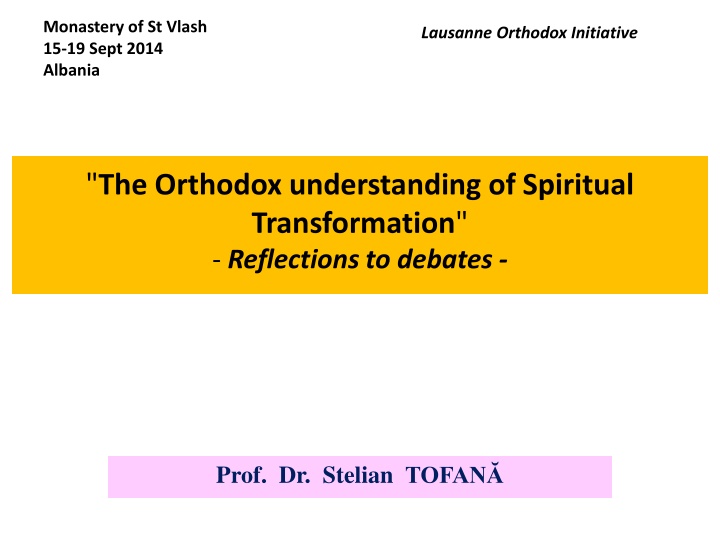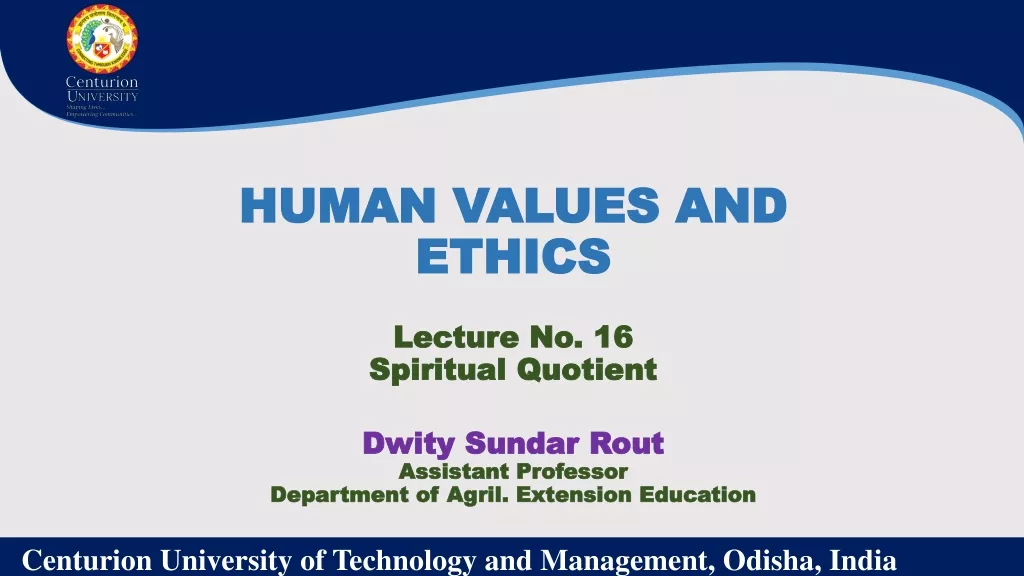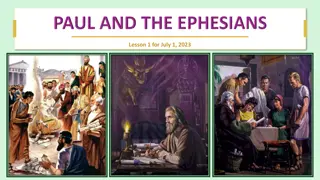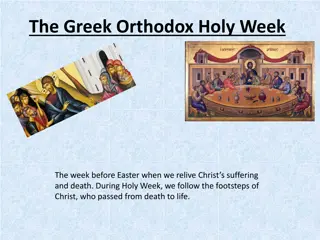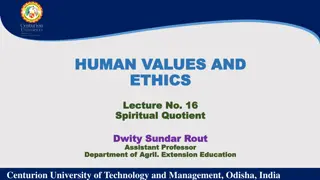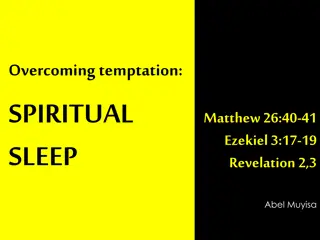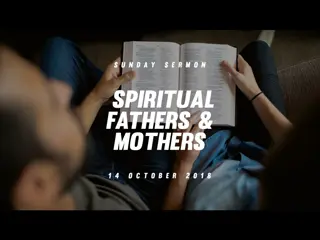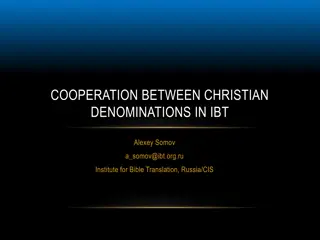The Orthodox Understanding of Spiritual Transformation
Explore the profound concepts of spiritual transformation within the Orthodox context, delving into conversion processes, active and passive aspects, and criteria that distinguish spiritual experiences. Reflect on the radical change in self, the impact on behaviors and beliefs, and the societal framework of spiritual growth.
Download Presentation

Please find below an Image/Link to download the presentation.
The content on the website is provided AS IS for your information and personal use only. It may not be sold, licensed, or shared on other websites without obtaining consent from the author.If you encounter any issues during the download, it is possible that the publisher has removed the file from their server.
You are allowed to download the files provided on this website for personal or commercial use, subject to the condition that they are used lawfully. All files are the property of their respective owners.
The content on the website is provided AS IS for your information and personal use only. It may not be sold, licensed, or shared on other websites without obtaining consent from the author.
E N D
Presentation Transcript
Monastery of St Vlash 15-19 Sept 2014 Albania Lausanne Orthodox Initiative "The Orthodox understanding of Spiritual Transformation" - Reflections to debates - Prof. Dr. Stelian TOFAN
Contents Preliminaries I. Conversion spontaneous process or a slow one ? II. Spiritual transformation: Gift and Becoming.Ways of achieving it.A New Testament Perspective aspect of Spiritual Transformation 1. Baptism spiritual rebirth (Born again). The passive and active 2. Re-evangelization birth and renewal by word virtues 3. Spiritual service of worship ( ) . Practicing 4. Involvement in the liturgical life of the Church Conclusions
Preliminaries Arthur J. Schwartz (Ed.D), has defined spiritual transformation = a dramatic change in religious belief, attitude, and behaviour that occurs over a relatively short period of time. The context in which this transformation appears: 1. An intensified devotion within the same religious structure 2. A shift from no religious commitment to a devout religious life 3. A change from one religion to another.
I. Conversion a spontaneous process or a slow (gradual) one ? In the christian sens, conversion is a spiritual process that produces the turning to God, transitioning from the state of sin to the state of grace, turning from unbelief to faith, from sin to virtue. spontaneous Conversion slow (gradual) - spiritual transformation = a constant conversion, a repentance understood as a state of living
II. Spiritual transformation: Gift and Becoming or its passive and active aspect. Ways of achieving it.A New Testament Perspective - complex process - includes a lot of people, events, expectations and experiences. - 6 criteria that distinguish spiritual transformation from other types of religious experiences 1. A spiritual transformation is a profound change in the self. 2. The change is not simply a matter of maturation, but is typically identified with a process (sudden or gradual) by which the transformed self is achieved. 3. This change in the self is radical in its consequences indicated by such things as a new centering of concern, interest, and behaviors
4. This new sense of self is perceived as higher or as emancipation from a previous dilemma or predicament. 5. This process occurs within a social medium or context, specifically spiritual transformation entails a religious framework within which the transformed self is described, acts, and is recognized by others. 6. If behaviors from these new ideals and changed habits of life do not follow, then there has been no transformation.
Ways of achieving spiritual transformation 1. Baptism spiritual rebirth St. Cyril of Alexandria It is the Father s will that man be partakers of the Holy Spirit, being born again to an unusual and new life and thus still while on earth to be a citizen of heaven...Therefore, we have been born again to newness of life and recreated for divine adoption passive and active aspect of spiritual transformation To the church of God which is at Corinth, to them that are sanctified ( ) in Christ Jesus, called to be saints ( ) with all that in every place call upon the name of Jesus Christ our Lord.. (1 Cor 1:2).
The Pauline Anthropology - marked by 3 notions : a. old man = sinful state (before conversion and baptism) unrighteous, fornicators, idolaters, adulterers, effeminate, abusers of themselves with mankind (homosexuals - NAS), thieves, covetous, drunkards, revilers, swindlers (1Cor 6:9-10). b. new man = the new state got in the Sacrament of Baptism: but you were washed ( ), but you were sanctified ( ), but you were justified ) in the name of the Lord Jesus Christ, and in the Spirit of our God (1Cor 6:11) c. new creation ( ) = the spiritual transformed and renewed man from a quality perspective Therefore if any man is in Christ, he is a new creature ( ); the old things passed away; behold, new things have come (2 Cor 5:17).
2. Re-evangelization birth and renewal by word Example: David and Nathan (2 Sam 12:1-5. 7.13) - outside the word = only correct judgements of value: the man who has done this deserves to die (2 Sam 12:5). - being involved in the word of God = metanoia: I have sinned against the Lord! (2 Sam 12:13)
3. Spiritual service of worship ( ) . Practicing of virtutes - Spiritual transformation presupposes the presentation our bodies as living sacrifices, holy and pleasing to God: I urge you therefore, brethren, by the mercies of God, to present your bodies a living and holy sacrifice ( ) acceptable to God, which is your spiritual (resonable) service of worship ( ) (Rom 12:1). - Body means here the whole being, personality in its entirety
4. Involvement in the liturgical life of the Church Maturing in our spiritual life requires: a - Confession the Eucharist b. Spiritual food Word of God c . Living the Liturgy after the Liturgy d. Practicing the Prayer and Virtues e. Living the life in humility (modesty) d. Leaving the sin
Conclusions 1. The beginning of spiritual transformation takes place in the Baptism. 2. Spiritual transformation is a lifelong process and identifies itself with the striving after holiness. 3. In Christianity there is no other way of spiritual transformation, except that which goes through Christ and through his Church. 4. Holiness is the perfection achieved with sweat, the radiance of the glory of Christ in human nature and a proof of His infinite power which, from dust and sin, forms the household of God - (Eph 2:19).
5. The Christian Spiritual Life is the life lived by a believer who has received the Holy Spirit and is spiritually alive to God. 6. Spiritual transformation is a new spirit-led life in which the person's spirit, joined to the Holy Spirit, directs the person's life, renewing their mind and redirecting their emotions, resulting in a will that is increasingly yielded to God and a heart that is transformed so that the person lives an increasingly Christ-like life. 7. Spiritual Transformation is a permanent living state in a continues metanoia (repentance)
